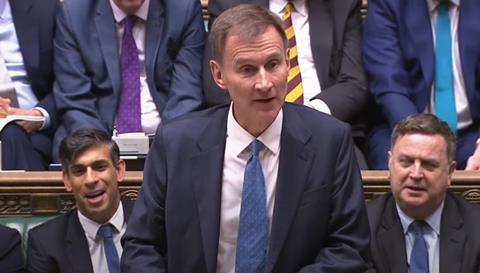Relief allowing firms to claim back cost of investments to be made permanent
Jeremy Hunt is cutting national insurance by 2% from January and has scrapped plans to end a tax cut allowing firms to claim back the cost of equipment in today’s autumn statement.
The chancellor described the “full expensing” measure which lets businesses claim 25% of the cost of investments in IT, equipment and machinery as the “largest business tax cut in modern British history”.
The cut will cost the Treasury £11bn a year and aims to stimulate business investment to boost economic growth and productivity.

Hunt said the move will mean the UK will have the most generous capital allowances in the G7 group of developed nations.
In the headline measure in an autumn statement which Hunt said was for a “country that has turned a corner”, national insurance paid by employees will be slashed from 12% to 10% from 6 January following a sharp drop in inflation last month from 6.7% to 4.8%.
But the statement was accompanied by a sharply downgraded economic growth forecast by the Office for Budget Responsibility (OBR).
A slower than expected reduction in inflation means the OBR now expects the economy will grow by 0.7% next year and 1.4% in 2025, down from 1.8% and 2.5% forecast in March.
Price rises are now not expected to return to normal levels until 2025, a year later than previously forecast, with the spending watchdog saying inflation will only fall to 2.8% next year, falling short of the 2% target.
Previously it forecast inflation would dive to 0.9% next year, and 0.1% the following year.
Other spending announcements in today’s statement include £50m over the next two years to increase the number of apprentices in engineering and other “key growth sectors”.
Financial incentives for investment zones and freeports will be extended from five years to 10 years, and a new £150m fund will be set up to support the programme.
Autumn Statement 2023
Hunt slashes taxes as OBR sharply downgrades growth forecast
Hunt announces £110m nutrient mitigation fund to ‘unlock 40,000 homes
Government promises planning reforms to speed up decision-making
Autumn statement 2023: Key measures at a glance
Autumn statement 2023: Industry reacts
Developers to be offered ‘premium planning service’ to speed up council decisions
Hunt pledged £520m in funding for developing life sciences and £960m to accelerate growth in green industries including offshore wind, electricity networks, nuclear, hydrogen and carbon storage and capture.
Regeneration projects in areas including Bolsover, Monmouthshire, Warrington and Cumbria will be handed £50m, while levelling up partnerships in Scotland will get £80m from the Treasury.
Key autumn statement measures
- £110m to deliver high-quality nutrient mitigation schemes to unlock 40,000 new homes.
- Pledge to ensure over time that “growth in public spending is lower than the growth in the economy”.
- £50m over two years to pilot ways to increase the number of apprentices in “engineering and other key growth sectors”.
- Allow local authorities to recover the full cost of major business planning applications in return for being required to meet “faster timleines”.
- £32m new homes to “bust the planning backlog” and develop housing quarters in Cambridge, London and Leeds.
- £450m to the local authority housing fund to deliver 2,400 new homes.
- A new permitted development right to allow any house to be converted into two flats.
- Increase universal credit and other benefits from next April by 6.7% in line with September’s inflation rate.
- Increase Local Housing Allowance rate to the 30% percentile of local market rents, helping 1.6m households average £800 from next year.
- Measures to cut grid access delays by 90% and offer up to £10,000 off electricity bills over 10 years for those living closest to transmission infrastructure.
- £500m over the next two years to fund innovation centres to make the UK an “AI powerhouse”.
- Creating a new, simplified research and development tax relief, as well as lowering the threshold for R&D relief for SMEs.
- £520m for life sciences.
- £960m for clean energy through the green industries growth accelerator, focused on offshore wind, electricity networks, nuclear and hybrid.
- Financial incentives for investment zones and tax relief for freeports from five years to 10 years.
- Three further investment zones focused on advanced manufacturing in the West Midlands, East Midlands and Greater Manchester and a second investment zone in Wrexham and Flintshire in Wales.
- Publish devolution deals in four areas, including Hull and East Yorkshire.
- £50m for “high quality regeneration projects”. From April 2024, any company bidding for large government contracts should demonstrate they pay their invoices within an average of 55 days to be reduced to 30 days.
- Reform taxes for the self-employed including scrapping class 2 national insurance.
- £11bn a year to make “full expensing” permanent – the “largest business tax cut in modern British history”.
- Mandatory work programme for jobseekers who have not found a job after 18 months. If people choose not to engage, they will lose benefits after six months.
- Increase in the living wage by 9.8% to £11.44.
- Cut main rate of national insurance by two percentage points to 10% from 6 January.


























No comments yet